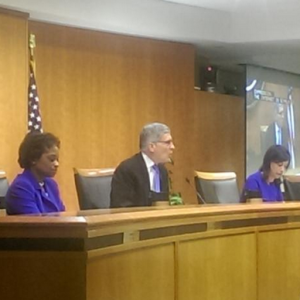Last week, the Federal Communications Commission finally released details of the Title II Internet reclassification it passed in a 3-to-2 party-line vote in February. In the statements issued by the three Democratic Commissioners who all voted for the rule, each gave credit to the critical role of 4 million public comments in shaping the FCC’s plan. But a new statement from an FCC spokeswoman seems to suggest the rhetoric used by the Commissioners to build support for the new regulations is inaccurate, and the FCC is aware many of the comments did not come from American citizens.
Chairman Tom Wheeler is already facing questions from Congress about his abrupt shift in course from the previous lighter-touch Net neutrality plans he had written. Congressional investigators are concerned that the White House had undue influence over an independent agency. In Wheeler’s statement released with the plan, he takes note of the President’s lobbying, but he says the “most important” input came from “nearly four million Americans who overwhelmingly spoke up in favor of preserving a free and open Internet.”
The two other Democrats on the Commission offered similar views.
“Four million Americans wrote this agency to make known their ideas, thoughts, and deeply-held opinions about Internet openness,” said Commissioner Jessica Rosenworcel. “They lit up our phone lines, clogged our e-mail in-boxes, and jammed our online comment system. That might be messy, but whatever our disagreements on network neutrality are, I hope we can agree that’s democracy in action and something we can all support.”
Commissioner Mignon Clyburn praised the “open process that would enable more than four million citizens to have a direct conversation with their government.”
The problem is that these statements, stressing the importance of the American public’s comments in completely reshaping the Commission’s plan, are not accurate, and experts worry about the role public comment has in shaping the rules. The FCC is an independent, expert agency, and yet it has based its rulemaking on comments it admits it is unsure of their source or what percentage of them are from US citizens.
FCC Spokeswoman Kim Hart sent a statement to Mike Wendy of mediafreedom.org (and shared with InsideSources) revealing the FCC does not know where many of the comments originated and that the FCC welcomes foreign input.
The FCC encouraged feedback from all interested parties in the Open Internet proceeding and released the comments received for the public to analyze. It is not unusual for commenters from outside of the United States to participate in FCC proceedings, and we welcomed their input on this important issue. To protect the privacy of those participating in its proceedings, the FCC does not record the IP addresses of comments submitted.
InsideSources sent Ms. Hart repeated requests last summer to clarify this exact point. She chose to not respond at that time but is now answering questions with the plan already passed by the Commission.
What concerns does this raise?
An investigation by InsideSources revealed an international coalition with ties to the Occupy Wall Street movement was seeking to rally the international community to petition the FCC. One of the organizations involved in the coalition collected 128,000 petition signatures, but the number of comments submitted by others in the coalition is unknown.
The FCC can accept international comments if it wishes, but an awareness that a sizeable percentage of comments may have come from outside the United States calls into doubt the rhetoric used by the Democratic commissioners that they listened to the voices of 4 million Americans.
In an email, FCC spokeswoman Hart pointed InsideSources to the data file containing the public comments. Some of the comments do contain self-reported zip codes. But the FCC did not act to verify any information from commenters, such as collecting IP addresses or contacting a random sample of commenters.
An analysis last summer funded by the Knight Foundation and conducted by the analytics firm Quid revealed that between 30-50% of the comments were templates. Some estimates are higher. And while the first round of comments was dominated by form letters supporting Title II, the second round was dominated by form letters opposing Title II.
Roslyn Layton, an expert on telecom policy with the American Enterprise Institute, notes: “If the FCC is supposed to be an independent, expert agency, then public comment should not be a priority. The FCC leans on the 4 million as its leading justification for net neutrality rules. It shows they have little to no evidence for their policy.”
She adds: “If public opinion matters so much, then net neutrality should be Congress’s decision—not five unelected commissioners.”

